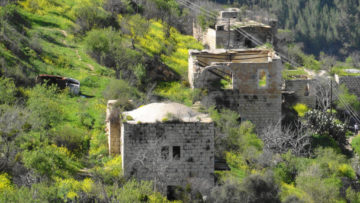George Abraham in Guernica:
 I gave my first lecture, at my first academic job, behind a wall of plexiglass, speaking to an awkwardly spaced out group of masked students who had maybe already given up – and honestly, who could blame them? I walked in sweating and late because my building’s social distancing protocol required me to run up five floors and down two to get to my third floor classroom. Leaning into the mic, I opened with the joke: “Welcome to apocalyptic poetry!”
I gave my first lecture, at my first academic job, behind a wall of plexiglass, speaking to an awkwardly spaced out group of masked students who had maybe already given up – and honestly, who could blame them? I walked in sweating and late because my building’s social distancing protocol required me to run up five floors and down two to get to my third floor classroom. Leaning into the mic, I opened with the joke: “Welcome to apocalyptic poetry!”
My students chuckled nervously. Maybe the joke was that it was day one of the fall semester, and who really wanted to be in a required advanced poetic form class? Or maybe it was my way of cutting the tension of our gathering, united by the sole purpose of discussing poetry in a time that, back then, felt newly apocalyptic to some.
Soon, apocalypse became a tired punchline. Languishing through mere existence, I did what any young Palestinian instructor of literature would likely do: I returned to Audre Lorde, who reminds us “poetry is not a luxury,” and June Jordan, who gives us models for writing against and despite the state.
More here.
